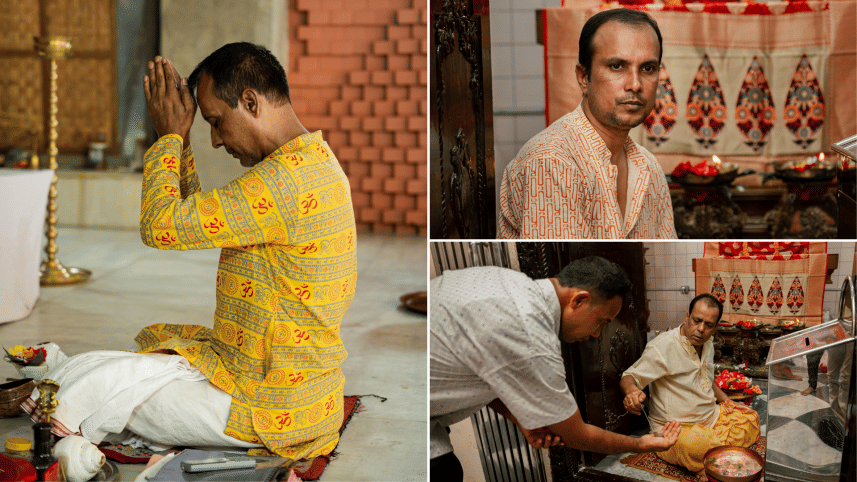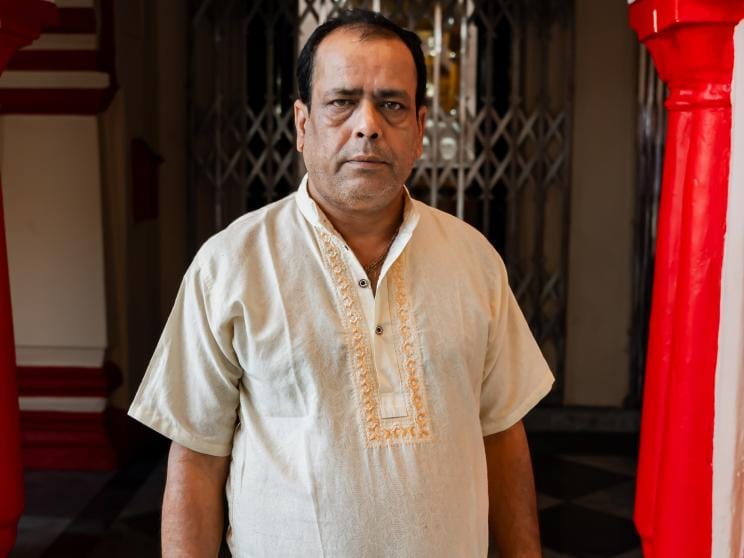In the heart of Dhaka, Durga comes home

In a temple that has stood tall for centuries, amidst economic strain and societal cracks, priests dressed in plain dhotis chant ancient mantras not for power, but for peace. They decorate the Devi not with opulence, but with devotion. They ask not for wealth, but for wisdom. And in doing so, they keep something sacred alive — not just at the Dhakeshwari Temple, but in the country itself.
"The prices have gone up… But so has our spirit"
On a quiet afternoon under the fading September sun, the echo of hammering idols and the scent of incense fuse in the courtyards of the Temple. This is not just another festival. For the priests, for the devotees, and for a country carrying invisible burdens, Durga Puja this year feels both heavier and holier.
Milon Chakraborty folds his hands, his voice unshaken but weary. "The prices of fruits, flowers… everything is higher than last year. And not just a little. A lot." It's not just the economy. "Still," he adds, "we try our best to make sure everything goes smoothly. That everyone who comes here sees beauty, not burden."
His words are simple, yet steeped in resilience. Even in the face of rising costs, the priests do not talk of cutting corners. They speak of adjustments. A five-taka incense stick is smaller now. Even the ten-taka item has shrunk, but it still lights the same flame.
This quiet surrender to the times, without complaint or drama, is perhaps the real puja.

When the Mother comes on an elephant
According to Rajib Chakraborty, Maa's arrival has already begun: "From the 27th, Bodhon will begin. Mother will come riding the elephant this year."
His tone carries both joy and alertness. "But the situation in the country is not like before. People need to be more careful now, especially at night." There's no denial of what's happening in the margins of the celebration. "Idols are being vandalised in some places," he says, almost in a whisper. "We see it in the news. It hurts us. Our puja is not just for ourselves. It is for the well-being of all."
So, they continue the rituals. Not because everything is perfect, but because they believe that something sacred must be preserved, no matter how unkind the world feels.

Bodhon: Waking the Goddess, waking ourselves
Priest Dharma Das Chattopadhya recalls the story of Bodhon with a certain gravity. "When the goddess was found asleep beneath the Bel tree, it was not just a moment of myth. It was a metaphor."
He pauses, then leans closer. "Even the gods could not find her in heaven or hell. They found her as a little girl, sleeping under a dusty saree."
And perhaps that's what this puja is about this year — waking up what's hidden within us. The forgotten tenderness. The neglected hope. The inner 'Sur' that must rise to silence the 'Asur'.
He shares that during Sandhi Puja, performed at the juncture of Ashtami and Navami, symbolic sacrifices are made. "But we don't sacrifice goats here. We offer pumpkins, bananas… something softer." It's a telling choice—violence is substituted with nourishment. Conflict is replaced with care.

"We pray for good sense, not gold"
What does a priest ask for in times like these?
"Not gold. Not even a good harvest," says Milon, shaking his head. "We will pray that those with 'Asur' nature are blessed with 'Sur'. That good sense enters their hearts."
His words might sound like poetry, but there is steel in them. "A human being cannot cause harm. A true human is the creator's best creation. But those who spread anarchy, I do not consider them human. Still, we pray for them too."
The puja at Dhakeshwari is not an escape. It is a confrontation with suffering, with injustice, and with hope.
Kashful and the children of the Mother
Barun Chakraborty has served at the temple for 19 years. When asked what gives him strength even when prices soar and hate sometimes spills into their sacred space, he simply says:
"Like the kashful in autumn—white and feathery from afar, but hollow when you look closely—many people appear to be well, but are empty inside."
He doesn't say this with bitterness. It's a gentle observation. "In our prayers, we ask that everyone—empty or not—find joy and success. That their minds fill with peace."
And that is where the heart of this story lies.



 For all latest news, follow The Daily Star's Google News channel.
For all latest news, follow The Daily Star's Google News channel.
Comments